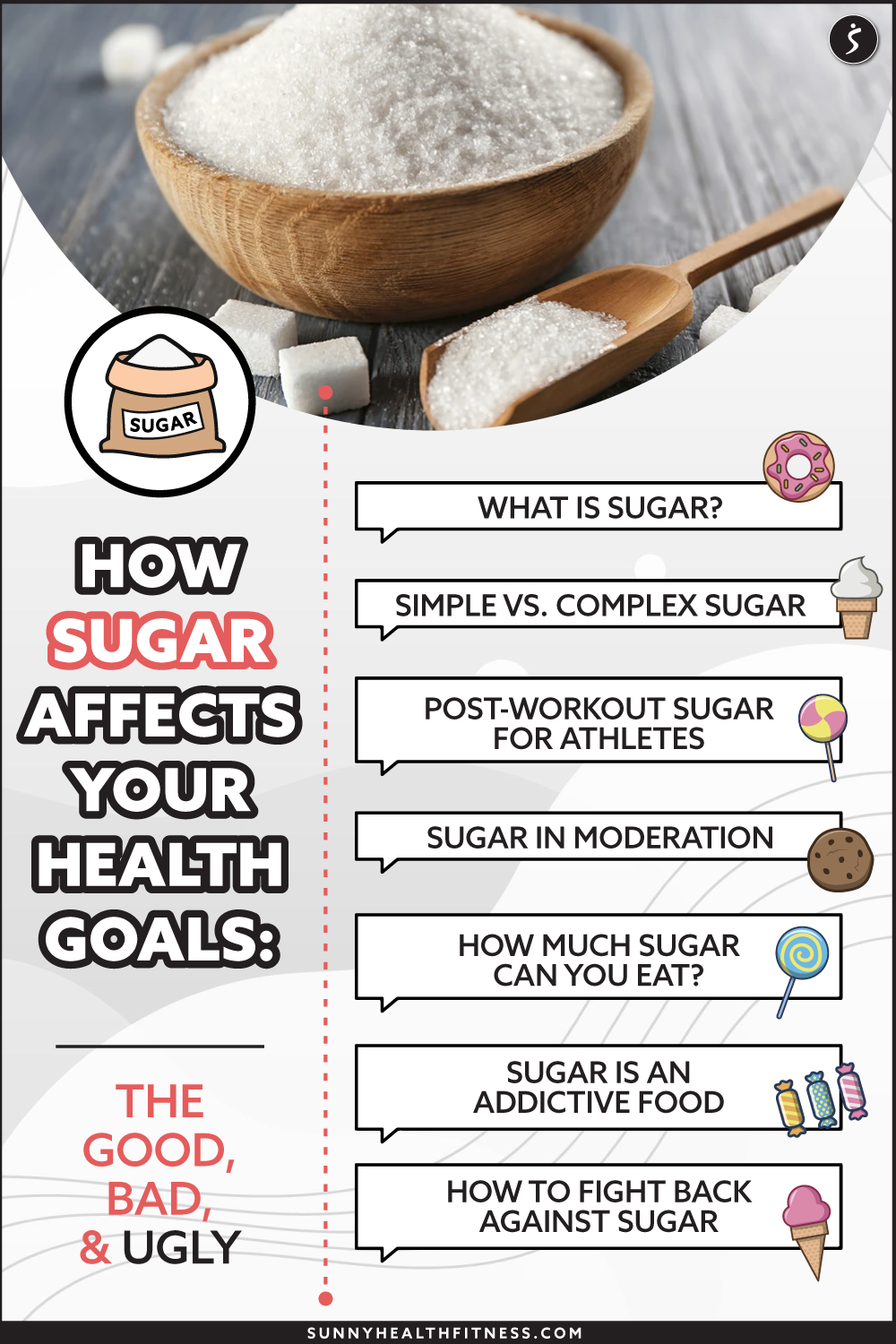I want to dive into how sugar affects your workouts, healthy lifestyle, and weight loss goals. I will give it to you straight - Sugar: The good, the bad, and the ugly.
*Before starting any new diet and exercise program, please check with your doctor and clear any exercise and diet changes with them before beginning.
What is Sugar?
Sugar is quite a popular character in the health, wellness, and nutrition space. But, before I move forward, let's explore what sugar is. It is naturally found in fruits, vegetables, milk and artificially added to many drinks and processed food.
The common foods and beverages disguise sugar in different forms, like high fructose corn syrup, alcohols, different kinds of sugar molecules such as fructose, glucose, or "healthier" alternatives like agave or coconut sugar.
Sugar usually shows up on the Nutrition Label as grams of added sugar but can not show up when artificial sweeteners like Stevia, Sucralose (Splenda), or Aspartame (Equal) are used.
Simple vs. Complex Sugar
These kinds of sugars are known as simple sugars because they are one or two molecule chains. They are quick and easy to digest while providing fast energy. Complex sugars have three or more molecule chains that take slightly longer to break down, digest, and utilize as energy.
How much, what kind, and when you eat carbohydrates should be based on your individual goals. We have a great article discussing the importance of realistic fitness goals, why you should have them, and how to start.
I want to stress the importance of knowing where you want to go because sugar, aka carbs, will strongly influence your goals. I will discuss the good, bad and ugly and the potential impacts sugar has on your body.
Post-Workout Sugar for Athletes
Good: Sugars are the food & drink of choice when it comes to high-performing athletes. After 90 to 120 minutes of exercise, all the energy stored as sugars in your muscles and liver, called glycogen, are utilized and depleted.
To continue to exercise and perform, you must replenish with carbs/sugars. This is why sports drinks and "energy" bars are so prevalent in endurance races and sports.
Consuming these sugar-packed snacks help fuel athletes performing at high levels to stay energized. Consuming sugar post-workout is a widespread practice of replenishing utilized glycogen stores. The answer to if you should eat sugar post-workout again depends on your goals. If performance is your goal, it may be a good idea; if body fat loss is your goal, it might not be.
Sugar in Moderation
Bad: The right kind of sugars in moderation is usually OK to eat in a balanced diet. But look at that statement. There are three stipulations I just placed on eating sugar.
- The right kind of sugar
- Usually OK
- Balanced diet.
These are things we have hopefully been hearing our whole life. But, unfortunately, the information on these three guidelines is all over the place. So I like to follow Whole30's guidelines regarding carbohydrates with a few exceptions. (Whole30 is an excellent source for help regarding nutrition).
It also highly depends on your goals and genetics. Some humans out there can eat a diet consisting of 75% carbohydrates and not gain an ounce of fat; on the other hand, some look at a bowl of pasta and feel the weight creeping on.
Anyone who has struggled with weight their whole life knows how challenging it is to eat carbs in moderation and still succeed in fat loss. This is because they cannot digest and utilize carbs as energy as efficiently as that person eating pasta, sandwiches, and candy who stays thin as a rail can.
How Much Sugar Can You Eat?
If fat loss is your goal, I recommend keeping your total sugar/carb consumption to about 10% of total daily calories, usually around 150-250 calories (40-60 grams). It does not matter if you eat sugar before your workout or after your workout.
Balanced carbohydrate intake in moderation of the right kinds of food is a beautiful place to be, but it is challenging to stay in this sweet spot, no pun intended!
Sugar Is An Addictive Food
Ugly: Have you ever took one bite into something sweet and were satisfied? Yeah, me neither. If you are one of the few who can eat just one cookie or one square of chocolate, we are all in envy of you. The reason most of us can't stop after one bite is because sugar is addictive.
With each bite, the feel-good hormone dopamine releases from our brain. Dopamine is associated with the reward circuit of our brain. When this neurotransmitter is released, we associate eating sugar with a pleasurable "high" and want to repeat this behavior.
Quite literally, we are programmed to want and crave sugar, and once we start, it is hard to stop. Sugar is hard to avoid. Walk into any grocery store, and you are inundated with sugar-packed, processed foods at every turn.
A pro-tip about grocery store shopping is to avoid the middle of the store shop around the outside; this is where all the produce and protein lives.
How to Fight Back Against Sugar
Sugar is in many food and drinks served as restaurants, easy-to-go options, and during most gatherings/celebrations. The safest method to always be in control of your food is to bring your own. Leaving it up to chance is a dangerous game.
When trying to avoid excess sugar, choosing the minimally processed, the whole-food option is always a good idea when out to eat or at a gathering. Remember always to bring it back to your goals and what you are trying to achieve for your health—not reaching your fat loss goal? Take a look at your sugar/carbohydrate intake.
After years of working with clients on their nutrition and weight management, sugar has become synonymous with carbohydrates because of what happens chemically in the body during digestion.
A lot of the marketing from large food companies are trying to disguise sugar and find ways to include it in their food. Educating yourself to learn about the good, bad, and ugly of sugar will help you make smarter food choices and help you reach your health goals.

























Add Your Name & Email
Please enter your name and email to continue.We won’t display your email publicly.